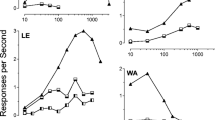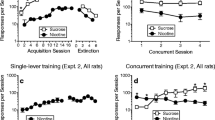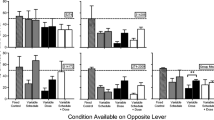Abstract
Studies have shown that both food deprivation and response cost have important influences on the magnitude of self-administration of a wide variety of psychoactive drugs. In an attempt to extend these findings to the smoked route of drug self-administration, the effects of food allotment and fixed-ratio (FR) value were evaluated in four male rhesus monkeys trained to smoke cocaine base. In the first phase of the experiment, monkeys were trained to self-administer smoked cocaine base under a chained progressive-ratio (PR), fixed-ratio (FR) schedule during daily experimental sessions. Monkeys were required to make 20 lever-press responses and then five inhalations on a smoking spout to obtain the first smoke delivery. The lever ratio then increased to 60, 140, 300, 620, 1260, 2540, and 4940 for each successive smoke delivery. The initial lever ratio value was reset to 20 at the beginning of each daily session. The body weights of three monkeys were determined under free-feeding conditions. Monkeys were then restricted to 100 g food and, when body weights had stabilized, the daily food allotment was increased to 150 g, approximately 210 g, or greater than 400 g (satiation). As the daily food allotment and body weight increased, the mean number of smoke deliveries decreased in two of three monkeys. In the second phase of the experiment, three monkeys were maintained under either food-satiated or food-restricted conditions. Body weights were maintained at approximately 90% of their free-feeding weights under food-restricted conditions. The cost of the drug (lever FR value) was constant within each experimental session, but was increased after 3 consecutive days of stable responding. Fixed-ratio values were increased from 128 to 256, 512, 1024, and 2048. Monkeys were required to complete the lever FR value and then to make five inhalations on the smoking spout to gain access to 1.0 mg/kg per delivery cocaine base. The mean number of smoke deliveries increased at FR 256, 512, and 1024 when monkeys were food-restricted as opposed to food-satiated. Correspondingly, the mean number of responses increased under food-restricted conditions. Responding continued to increase over a wider range of FR values, and the peak number of responses was higher under food-restricted, as opposed to food-satiated conditions. These results, using the smoking route of administration, are consistent with the hypothesis that food deprivation increases the self-administration of reinforcing drugs.
Similar content being viewed by others
References
Bulik, CM, Brinded EC (1994) The effect of food deprivation on the reinforcing value of food and smoking in bulimic and control women. Physiol Behav 4:665–672
Carroll ME (1982) Rapid acquisition of oral phencyclidine self-administration in food-deprived and food-satiated rhesus monkeys: concurrent phencyclidine and water choice. Pharmacol Biochem Behav 17:341–346
Carroll ME (1987) Concurrent access to two concentrations of orally delivered phencyclidine: effects of feeding conditions. J Exp Anal Behav 47:347–362
Carroll ME, Boe IN (1982) Increased intravenous drug self-administration during deprivation of other reinforcers. Pharmacol Biochem Behav 17:563–567
Carroll ME, Boe IN (1984) Effect of dose on increased etonitazene self-administration by rats due to food deprivation. Psychopharmacology 82:151–152
Carroll ME, Meisch RA (1979) Effects of food deprivation on etonitazene consumption in rats. Pharmacol Biochem Behav 10:155–159
Carroll ME, Meisch RA (1984) Increased drug-reinforced behavior due to food deprivation. Adv Behav Pharmacol 4:47–88
Carroll ME, Stotz DC (1983) Orald-amphetamine and ketamine self-administration by rhesus monkeys: effects of food deprivation. J Pharmacol Exp Ther 227:28–34
Carroll ME, France CP, Meisch RA (1981) Intravenous self-administration of etonitazene, cocaine and phencyclidine in rats during food deprivation and satiation. J Pharmacol Exp Ther 217:241–247
Carroll ME, Stotz DC, Kliner DJ, Meisch RA (1984) Self-administration of orally delivered methohexital in rhesus monkeys with phencyclidine or pentobarbital histories: effects of food deprivation and satiation. Pharmacol Biochem Behav 20:145–151
Carroll ME, Krattinger KL, Gieske D, Sadoff DA (1990a) Cocaine base smoking in rhesus monkeys: reinforcing and physiological effects. Psychopharmacology 102:443–450
Carroll ME, Stitzer ML, Strain E, Meisch RA (1990b) The behavioral pharmacology of alcohol and other drugs. Recent Dev Alcohol 8:5–46
Carroll ME, Carmona GG, May SA, Buzalsky S, Larson C (1992) BuprenorphineÕs effects on self-administration of smoked cocaine base and orally delivered phencyclidine, ethanol and saccharin in rhesus monkeys. J Pharmacol Exp Ther 261:26–37
Comer SD, Hunt VR, Carroll ME (1994) Effects of concurrent saccharin availability and buprenorphine pretreatment on demand for smoked cocaine base in rhesus monkeys. Psychopharmacology 115:15–23
de la Garza R, Johanson CE (1987) The effects of food deprivation on the self-administration of psychoactive drugs. Drug Alcohol Depend 19:17–27
de la Garza R, Bergman J, Hartel CR (1981) Food deprivation and cocaine self-administration. Pharmacol Biochem Behav 15:141–144
Files FJ, Andrews CM, Lewis RS, Samson HH (1993) Effects of manipulating food availability on ethanol self-administration by P rats in a continuous access situation. Alcohol Clin Exp Res 17:586–591
Franklin JC, Schiele BC, Brozek J, Keys A (1948) Observations on human behavior in experimental semistarvation and rehabilitation. J Clin Psychol 4:28–45
Hall SM, Ginsberg D, Jones RT (1986) Smoking cessation and weight gain. J Clin Consult Psychol 54:342–346
Hollister AS, Breese GR, Kuhn CM, Cooper BR, Schanberg SM (1976) An inhibitory role for brain serotonin-containing systems in the locomotor effects ofd-amphetamine. J Pharmacol Exp Ther 198[1]:12–22
Lang WJ, Latiff AA, McQueen A, Singer G (1977) Self-administration of nicotine with and without a food delivery schedule. Pharmacol Biochem Behav 7:65–70
Mabry PD, Campbell BA (1975) Potentiation of amphetamine-induced arousal by food deprivation: effect of hypothalamic lesions. Physiol Behav 14[1]:85–88
Niaura R, Clark MM, Raciti MA, Pera V, Abrams DB (1992) Increased saliva cotinine concentrations in smokers during rapid weight loss. J Consult Clin Psychol 60:985–987
Oei TPS, Singer G, Jeffreys D, Lang W, Latiff A (1978) Schedule-induced self-injection of nicotine, heroin and methadone by naive animals. In: Colpaert FC, Rosecrans JA (eds) Stimulus properties of drugs: ten years of progress. North-Holland Elsevier, Amsterdam, pp 506–516
Takahashi RN, Singer G (1980) Effects of body weight levels on cannabis self-injection. Pharmacol Biochem Behav 13:877–881
Author information
Authors and Affiliations
Rights and permissions
About this article
Cite this article
Comer, S.D., Turner, D.M. & Carroll, M.E. Effects of food deprivation on cocaine base smoking in rhesus monkeys. Psychopharmacology 119, 127–132 (1995). https://doi.org/10.1007/BF02246152
Received:
Revised:
Issue Date:
DOI: https://doi.org/10.1007/BF02246152




